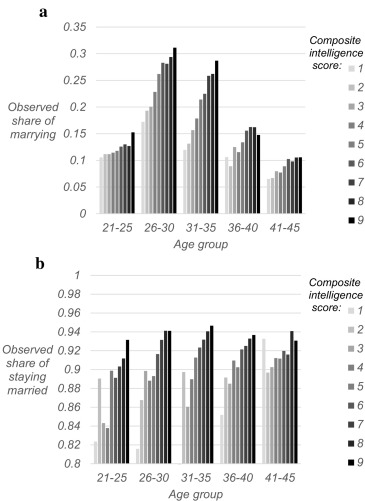This week we are discussing what is going on with modern dating, marriage, and divorce.
It is common in the Manosphere to encourage young men to avoid marriage. This goes back a long time.
For example, F. Roger Devlin—who coined the modern iteration of the term ‘hypergamy’—wanted men to marry in their late 20s to early 30s—to gain valuable life experience—while he wanted women to marry in their late teens and early twenties—to gain as little life experience as possible.
It has long been recognized that divorce is correlated with marriage at a young age. But, in “A Case Study on Marriage,” I noted that this was a confounded statistic.
I recently found this study which does a good job breaking down how divorce and age are confounded by intelligence. This study looks at marriage by the intelligence score of the male partner. It concludes:
The results suggest intelligence to be an evolutionary fitness indicator in mating.
…
A series of regression models confirms the direct effect of residualized intelligence on marriage behavior over and above its indirect effect through income, social status, and other control variables. These findings provide empirical evidence for the notion of evolutionary psychology that human intelligence, as an intangible fitness indicator, directly influences mating prospects, rather than merely exerting its influence through the tangible resources of income and social status.
This will be shocking to those who believe that physical attractiveness (“alpha’) is the most important attribute, or that financial decisions (‘beta’) play the key role in marriage.
Now, let’s look at the data:
First, those with below average intelligence are less likely to marry in general.
Second, divorce is much more likely to occur with those who have below average intelligence.
Third, those with below average intelligence are more likely to marry earlier in life compared to everyone else.
But when we only look at those with above-average IQs—especially people in the 70th, 80th, and 90th deciles—the picture changes substantially.
First, they are more likely to marry than anyone else.
Second, they are the least likely to divorce.
Third, they can marry at any age and mostly still beat every other group at divorce risk.
The point is, the advice the Manosphere gives (to avoid early marriage) is not good as general advice. After all, if divorce risk avoidance was so high a priority, it would necessarily be saying that only the more highly intelligent should marry. You should be asking yourself why it it is not giving this advice.
Let’s drive this point home. A man with at least a 90th percentile intelligence (~120 or higher) can marry as young as he likes and have a lower divorce risk than anyone in the 70th or lower percentiles. So if it is too risky for such a man to marry young, then marriage should, logically, be reserved only for the elite (80th percentile or higher).
We have a commenter here who often points out that, according to the Manosphere, marriage is only for the elite (though he uses a different term). He’s right. He isn’t right because the Manosphere actually says this, he is right because this is the necessary logical implication of what the Manosphere teaches.
I have taken a lot of flak for “attacking” the Manosphere. But I’m not attacking the Manosphere, I’m criticizing it for giving general advice without respect to the individual man’s and woman’s situation, as if everyone were blank slates. The many—hundreds and perhaps thousands—of “universal” principles—axioms, commandments, rules, regulations, laws, maxims, protocols, methods, procedures, codifications, addendums, organizational charts—are not universal. They need to be viewed, not as truths that apply to everyone, but as things that may apply to some people in some situations from time to time.
Perhaps you object that the Manosphere is quite diverse, and so everyone does not agree with each and every proposed principle. And you would be absolutely correct. But the problem with the lack of unity of among the Manosphere isn’t the point. It is that there is such a common and widespread belief that universal principles can exist at all. For example, the AWALT presumption is insidious.
So, if you qualify one of those universal principles like this….
Smart people should get married and everyone else should not.
…you would get vilified, even though this is exactly what you should do if the Manosphere’s principles on avoiding divorce are correct. Instead, you’ll get stuff like this:
Who would you rather take advice from: A guy who got lucky and thinks he’s brilliant; or a guy who can tell you all kinds of ways to screw it up and has learned from them?
So let’s embrace this. Which should you take advice from: the one who thinks that luck is more important, or the one who thinks intelligence is? After all, there is no evidence that marital success is driven by random chance, but there is a ton of evidence that intelligence plays a huge role.
But I’ll take one step back. Why are we concerned with what the unregenerate are doing? Why are we trying to make what is broken whole without trying to do so in Christ? And if Christ regenerates, what does all of this matter anyway?


Pingback: When Should You Get Married? - Derek L. Ramsey
Pingback: Modern Marriage and Divorce - Derek L. Ramsey